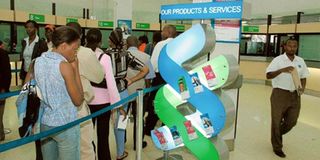Loan pain as CBK raises interest rates

Banks may raise interest rates. Photo/FILE
If you have a loan from the bank, you might need to dig deeper into your pocket to service it. (Read: House team places blame for slide of shilling on CBK)
The Central Bank of Kenya (CBK) on Wednesday increased its key interest rate by 400 basis points — that is, from 7 per cent to 11 per cent — in a bold move to stabilise the shilling.
The decision to raise the Central Bank Rate, known in the trade as the CBR, is intended to attract investors back into the country and strengthen the flow of much-needed dollars.
However, the measure will hit borrowers particularly hard because banks are likely to raise the lending rates.
The shilling has lost about 26 per cent of its value this year, reaching a record low of Sh104 to the dollar last week, and is one of the world’s worst performing currencies at the moment.
At 11 per cent, the current interest rate is the highest since 2006 and is expected to discourage borrowing, which has been blamed for increasing the amount of money in circulation and therefore fuelling inflation.
“Though it will fix the shilling crisis, Kenyans must be prepared for costlier bank loans,” said Mr Dickson Magecha, a forex trader at Standard Chartered Bank.
However, some economists think the measure is not enough, citing the rising inflation rate projected to reach 20 per cent before the end of the year.
“This is not enough if the inflation figures are to be believed. To contain the situation fully, the CBK should have increased the rate to about 15 per cent, close to inflation figures. The higher rates are needed to convince foreign investors that the government is taking inflation seriously and therefore inject back into the country foreign exchange,” said Mr Gitau Githongo, an economist based in Nairobi. More than six commercial banks, including Standard Chartered, Development Bank.
Bank of India, I&M Bank, Commercial Bank of Africa and Victoria Commercial Bank, have increased minimum interest on loans to about 16.5 per cent.
With the latest increment, made after a Monetary Policy Committee (MPC) meeting, it is now inevitable that the rest will follow suit.
Analysts argue that the move will be counter-productive in the long term as it will discourage borrowing, which is critical in growing businesses and creating jobs.
Kenya’s traditional source of dollars has been agricultural cash crops such as coffee, tea and horticulture.
But these have been affected by the drought, leading to low production. At the same time, the drought has led to importation of the country’s staple food, maize, piling pressure on the currency.
In its statement, the MPC said the move was necessary to protect the country’s economic growth that was under threat from a weakening shilling and rising cost of living.
The CBK, for the first time, publicly admitted that it had underestimated the crisis.
“The committee carefully examined a broad array of available information and analyses that showed these developments are a threat to economic recovery and macroeconomic stability: second quarter growth declined to 4.1 per cent,” the statement signed by CBK’s governor Njuguna Ndung’u said.
“Decisive and immediate action is required from the monetary policy side to stem these inflationary pressures, stabilize the exchange rate and re-establish a healthy growth base.”
News of the increase was welcomed by the market after the shilling gained marginally to trade at about 101.20 against the dollar.
However, several players said the decision had taken too long to come.
“This was long overdue given the prevailing differences between the CBR and Treasury Bill rates. For instance, whereas the CBR rates had only risen by about 100 per cent, the T-bill had shot up by up to 1,300 per cent in the same period,” Mr Magecha said.
Though the market was prepared for an increase, it was not expecting it would be of such a magnitude given CBK’s previous policy stances.
The CBK reckons that though an enhanced tightening of the monetary policy stance is required at this time it must be complemented by increasing supply of food, fuel and energy to tame inflation that has shot up to 17.32 per cent in September.




